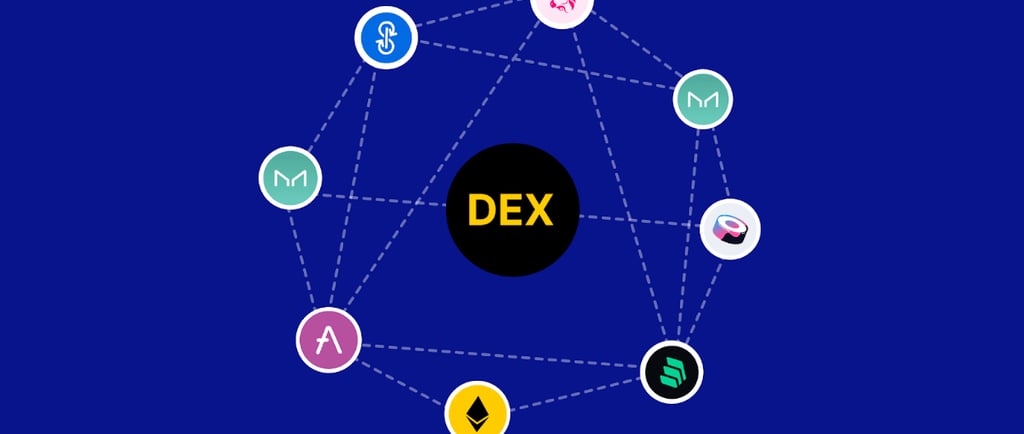Understanding Decentralized Exchanges (DEXs)


In the rapidly evolving world of cryptocurrency, understanding decentralized exchanges (DEXs) is pivotal for those seeking more control over their digital assets. Unlike traditional centralized exchanges, DEXs operate without a central authority, providing a unique approach to trading cryptocurrencies. This blog post will delve into the fundamentals of DEXs, explore their advantages and challenges, and examine their role in the future of cryptocurrency.
What Are Decentralized Exchanges and How Do They Work?
Decentralized exchanges (DEXs) are innovative platforms that facilitate direct peer-to-peer trading of cryptocurrencies without needing an intermediary. Utilizing blockchain technology, DEXs leverage smart contracts to manage transactions autonomously, ensuring that trades are executed securely and transparently. Unlike traditional exchanges, DEXs allow users to retain full control over their private keys and assets, providing a heightened level of security and ownership.
In a decentralized exchange, trades occur directly from user wallets, linked to the platform through secure protocols. This design reduces risks associated with centralization, such as large-scale hacks, by ensuring that funds are never held by a single entity. Instead, every transaction is recorded on the blockchain, creating an immutable and transparent ledger that fosters trust and accountability.
Smart contracts play a crucial role in DEX operations, executing trades automatically when predefined conditions are met. This eliminates the need for a central authority to oversee transactions, streamlining the trading process while maintaining security and integrity. While DEXs offer significant advantages, such as enhanced security and privacy, they also present challenges like lower liquidity and a steeper learning curve for new users. Understanding how these platforms work is essential for navigating the evolving landscape of cryptocurrency trading.
Key Advantages of Using Decentralized Exchanges
Decentralized exchanges (DEXs) offer several compelling advantages. Enhanced security is a major benefit; users keep control of their private keys, reducing the risk of hacking. This decentralized approach eliminates the single point of failure that plagues centralized exchanges.
Privacy is another standout feature. DEXs do not require users to register or provide personal information, allowing for anonymous trading. This level of privacy is particularly appealing for those who value discretion and data security.
Additionally, DEXs provide access to a broader range of tokens. Unlike centralized exchanges that might restrict listings, DEXs often feature newly issued tokens and a wider variety of cryptocurrencies. This openness allows traders to explore and invest in emerging digital assets before they appear on more traditional platforms.
These attributes make decentralized exchanges a valuable tool for anyone looking to maintain control, privacy, and a diversified portfolio in the ever-changing cryptocurrency landscape.
Common Challenges and Limitations of DEXs
Decentralized exchanges (DEXs) present several challenges that users should be aware of. One significant issue is liquidity. Compared to centralized exchanges, DEXs often have lower trading volumes, which can result in slippage and wider bid-ask spreads. This can be particularly problematic when trying to execute large trades without significantly impacting the market price.
The user experience on DEXs can also be more complex. Unlike centralized platforms that often offer customer support and intuitive interfaces, DEXs require users to manage their own private keys and understand the intricacies of blockchain technology. This self-custody approach can be intimidating, especially for those new to the cryptocurrency space.
Additionally, the interaction with smart contracts, while a cornerstone of DEX functionality, can add another layer of complexity. Users must be cautious and knowledgeable about the contracts they engage with to avoid potential pitfalls. The decentralized nature of these platforms also means that there's typically no recourse if something goes wrong, placing the onus entirely on the user.
Understanding these limitations is crucial for anyone looking to navigate the world of decentralized exchanges effectively.
Evaluating Security Measures in Decentralized Exchanges
Security is a paramount concern for any cryptocurrency enthusiast, and DEXs address this by implementing various measures to safeguard user assets. The decentralized nature of these exchanges means that funds are not stored in a central location, reducing the risk of a single point of failure.
DEXs employ advanced cryptographic techniques to secure transactions and ensure the integrity of smart contracts. Audits and security reviews are often conducted to identify and rectify potential vulnerabilities. Users are encouraged to follow best practices, such as using hardware wallets and enabling two-factor authentication, to further enhance security.
While decentralized exchanges are generally considered safer than centralized ones, users should remain vigilant. Staying informed about security updates and potential threats is crucial for protecting one's assets in the dynamic world of cryptocurrency.
Evaluating the security measures of a DEX involves understanding the protocols in place for transaction verification and asset storage. Leading DEXs often undergo rigorous third-party audits to ensure the robustness of their smart contracts. These audits help uncover potential weaknesses that could be exploited by malicious actors.
Additionally, the decentralized nature of DEXs requires users to be more proactive in safeguarding their assets. This includes being cautious about phishing attempts, double-checking contract addresses, and staying updated on best security practices.
The Future of Decentralized Exchanges in Cryptocurrency
Decentralized exchanges are set to revolutionize the cryptocurrency ecosystem further. Emerging technologies like layer-2 solutions and cross-chain interoperability aim to enhance DEX scalability and user experience. These advancements will help address existing challenges such as lower liquidity and complex user interfaces, making DEXs more accessible and efficient.Regulatory landscapes will also play a crucial role. As governments and regulatory bodies develop frameworks for digital assets, DEXs may encounter new compliance requirements. However, their decentralized nature offers inherent resilience, allowing them to adapt and thrive even in stringent regulatory environments.The ongoing rise of decentralized finance (DeFi) underscores the transformative potential of DEXs. By facilitating seamless, peer-to-peer trading, they are integral to the broader adoption of DeFi services. This symbiotic relationship between DEXs and DeFi platforms will likely drive innovations, creating a more robust and inclusive financial system.In summary, the future of decentralized exchanges looks promising, with technological advancements and regulatory shifts shaping their evolution. Staying informed and adaptable will be key for users navigating this dynamic landscape.
